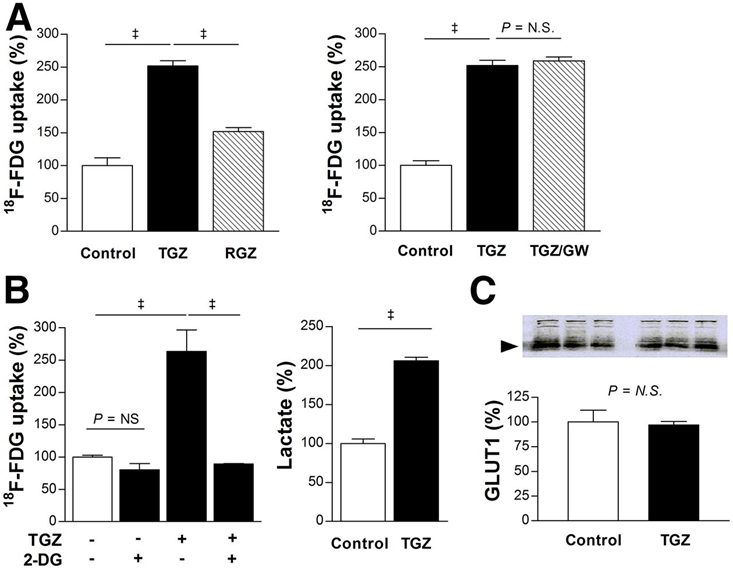글로벌 연구동향
핵의학
![[J Nucl Med] Troglitazone Stimulates Cancer Cell Uptake of 18F-FDG by Suppressing Mitochondrial Respiration and Augments Sensitivity to Glucose Restriction.](/enewspaper/upimages/admin_20160215143211_R.jpg) 2016년 02월호
2016년 02월호
[J Nucl Med] Troglitazone Stimulates Cancer Cell Uptake of 18F-FDG by Suppressing Mitochondrial Respiration and Augments Sensitivity to Glucose Restriction.성균관의대/문승환, 이경한*
- 출처
- J Nucl Med
- 등재일
- 2016 Jan
- 저널이슈번호
- 57(1):129-35. doi: 10.2967/jnumed.115.162016. Epub 2015 Oct 8.
- 내용

Troglitazone augments T47D cell glycolytic flux in PPARγ-independent manner

Anticancer effect of troglitazone is potentiated by restricted glucose availability.
Abstract
We evaluated how troglitazone influences cancer cell glucose metabolism and uptake of (18)F-FDG, and we investigated its molecular mechanism and relation to the drug's anticancer effect.
METHODS:
Human T47D breast and HCT116 colon cancer cells that had been treated with troglitazone were measured for (18)F-FDG uptake, lactate release, oxygen consumption rate, mitochondrial membrane potential, and intracellular reactive oxygen species. Viable cell content was measured by sulforhodamine-B assays.
RESULTS:
Treatment with 20 μM troglitazone for 1 h acutely increased (18)F-FDG uptake in multiple breast cancer cell lines, whereas HCT116 cells showed a delayed reaction. In T47D cells, the response occurred in a dose-dependent (threefold increase by 40 μΜ) manner independent of peroxisome proliferator-activated receptor-γ and was accompanied by a twofold increase of lactate production, consistent with enhanced glycolytic flux. Troglitazone-treated cells showed severe reductions of the oxygen consumption rate, indicating suppression of mitochondrial respiration, which was accompanied by significantly decreased mitochondrial membrane potential and increased concentration of reactive oxygen species. Troglitazone dose-dependently reduced T47D and HCT116 cell content, which was significantly potentiated by restriction of glucose availability. In T47D cells, cell reduction closely correlated with the magnitude of increase in relative (18)F-FDG uptake (r = 0.821, P = 0.001).
CONCLUSION:
Troglitazone stimulates cancer cell uptake of (18)F-FDG through a shift of metabolism toward glycolytic flux, likely as an adaptive response to impaired mitochondrial oxidative respiration.
Author information
Moon SH1, Lee SJ2, Jung KH1, Quach CH1, Park JW1, Lee JH1, Cho YS1, Lee KH3.
1Department of Nuclear Medicine, Samsung Medical Center, Sungkyunkwan University School of Medicine, Seoul, Korea; and.
2Department of Nuclear Medicine, Ajou University School of Medicine, Suwon, Korea.
3Department of Nuclear Medicine, Samsung Medical Center, Sungkyunkwan University School of Medicine, Seoul, Korea; and khnm.lee@samsung.com.
- 키워드
- 18F-FDG; cancer; glycolysis; mitochondria; troglitazone
- 연구소개
- 최근 당뇨병 치료제들이 당뇨 치료 효과뿐만 아니라 항암효과를 지니고 있음이 알려지면서 이 약들이 지닌 잠재적 가능성이 주목받고 있습니다. 당뇨병 치료제들이 지니고 있는 항암효과는 암세포의 미토콘드리아 기능과 포도당 대사와 일부 연계되어 있을 것으로 예상하고 있으나 확립된 바가 많지 않아 추가적인 연구가 필요한 실정입니다. 저희는 당뇨치료제로 사용 되었던 troglitazone을 대상으로 하여 이 약이 암세포의 포도당 대사에 어떤 영향을 미치고 이것이 어떠한 기전으로 항암효과와 연관되어 있는지를 조사하였습니다. 최근 주목 받고 있는 암세포 대사와 항암치료 분야에 관심 있는 연구자들에게 도움이 될 만한 좋은 정보라 생각합니다.
- 덧글달기







